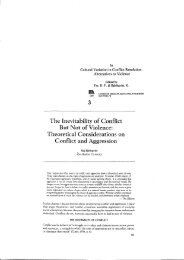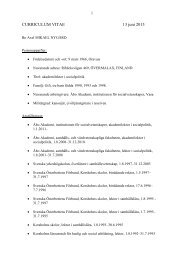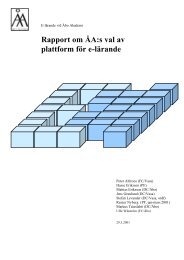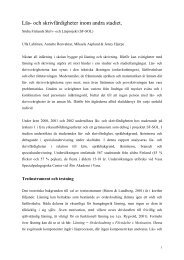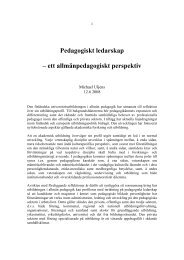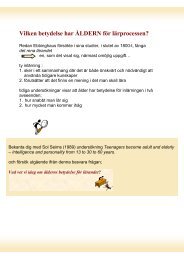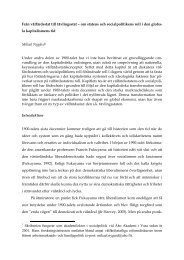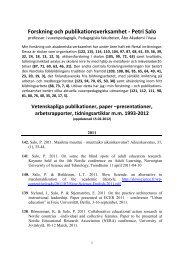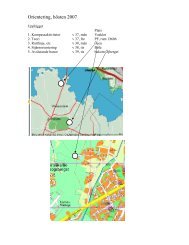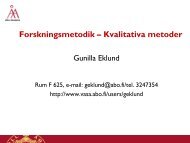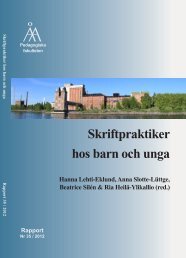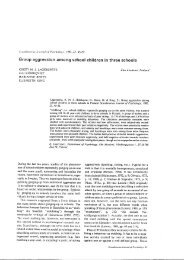Parties, Candidates and Citizens On-Line - Åbo Akademi
Parties, Candidates and Citizens On-Line - Åbo Akademi
Parties, Candidates and Citizens On-Line - Åbo Akademi
Create successful ePaper yourself
Turn your PDF publications into a flip-book with our unique Google optimized e-Paper software.
2003b; Gibson & Ward 2002). Regarding political c<strong>and</strong>idates, there are several studies<br />
which have shown that major party c<strong>and</strong>idates are more inclined to have a campaign<br />
website than their minor <strong>and</strong> fringe party counterparts (e.g. Gibson & McAllister 2003;<br />
Greer & LaPointe 2003; Kamarck 2002). Scholars have also found that major party<br />
c<strong>and</strong>idates tend to have more sophisticated websites, in terms of content richness <strong>and</strong><br />
presentation, than the c<strong>and</strong>idates of minor <strong>and</strong> fringe parties (e.g. Davis 1999; Greer &<br />
LaPointe 2003; Margolis & Resnick 2000, 53-74).<br />
The discussion in this section has highlighted both a theoretical <strong>and</strong> empirical<br />
divergence within the research field. There both optimistic <strong>and</strong> pessimistic scholarly<br />
visions, <strong>and</strong> corresponding empirical findings, concerning the internet’s potential impact<br />
on the pluralistic competition for the positions of power in representative democracies.<br />
Some perceive the internet as having a significant impact on the patterns of electoral<br />
competition between political actors. Others see cause <strong>and</strong> effect in reverse order: The<br />
on-line world will not be unaffected by off-line realities, hence only serving to replicate<br />
familiar patterns of electoral competition. As will be evident from the discussion in the<br />
subsequent section, this theoretical <strong>and</strong> empirical inconclusiveness is also repeated<br />
regarding the use of on-line politics by citizens.<br />
2.2. <strong>Citizens</strong> <strong>and</strong> the internet<br />
It has been said that the internet has provided citizens with new opportunities for political<br />
participation (e.g. Budge 1996, 28-31). The internet could serve to engage citizens in<br />
political activity (cf. Norris 2001b, 218). Norris (1999; 2001b, 218-219) divides the visions<br />
concerning the internet’s impact on citizens’ political participation into two categories: the<br />
mobilization theory <strong>and</strong> reinforcement theory. These two topics concerning the political<br />
activity on the internet by citizens are further discussed in this section.<br />
The mobilization theory recapitulates several optimistic visions regarding the<br />
internet’s ability to affect citizens’ political activity (e.g. Barber 1984; Budge 1996; Dahl<br />
1989; Dertouzos 1997; Negroponte 1995; Rheingold 1993; Schwartz 1996). The theory<br />
states that the internet has the potential to: “inform, organize <strong>and</strong> engage those who are<br />
currently marginalized from the existing political system […] so that these groups will<br />
gradually become drawn into public life <strong>and</strong> civic communities” (Norris 2001b, 218).<br />
Four arguments have been put forward in favour of this view (ibid.): Firstly, the internet<br />
provides ample opportunity for political engagement. Secondly, the relative ease <strong>and</strong> low<br />
costs of receiving information via the internet could reduce the barriers for citizens to<br />
learn about public matters (cf. Downs 1957). Thirdly, the vast amount of information<br />
available on the internet gives citizens opportunities to become more informed about<br />
public affairs, <strong>and</strong> thus more articulate in expressing their views, <strong>and</strong> more prone to<br />
14



